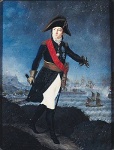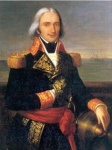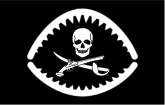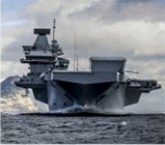Drouot, the son of a baker and Napoleonic General has a rare claim to fame apart from his military career in the army. Read on..
Joining the army in 1793 he graduated at the top of his class and was commissioned to the artillery. Serving with the Army of the North in the Revolutionary wars he fought at Hondshcoote and Wattignes (1793) becoming a lieutenant in 1794. He then fought at Fleures and was promoted to captain in 1796. He moved from the Northern and Rhine theaters in 1798 to Naples and was present at the French capture of that city in Jan 1799. He was then at the battle of Trebia where Suvarov (Ru) defeated the French.
In 1800 he was back to the Army of the Rhine serving on general Eble's staff (famed for the bridges over the Beresina allowing the remnants of Napoelon's army to escape Russia in 1812). he then fought at Hohenlinden and was promoted to capitaine commandant in 1802 leading the 14th co of the 1st Foot Artillery.
In July 1804 he was posted to Toulon joining General Lauriston who commanded the troops (army) assigned to the fleet and he sailed with Villeneuve's fleet to the West Indies and back, being in the action against Calder on 22nd July 1805. Promoted chef de battalion, he was unaware of his rise since he had again embarked with the fleet for the Trafalgar denouement. Sailing on the Indomptable (as he had earlier) he experienced the full horror of naval warfare in his ship's action with Bellisle (RN) but his ship survived the battle and managed to return to Cadiz.
Promoted to major in 1807 he was involved with training artillery at Metz and then an inspector in the armaments industry. In 1808 he took the post of director of the artillery park with the Army of Spain. However in April 1808 the Imperial Guard Foot Artillery was established and he was seconded to train the first foot companies for this unit. He was thus present for Napoleon's invasion of Spain (1808) , the battle of Wagram against the Austrians (1809) where he performed with exceptional skill receiving his only wound for his career from a shell splinter to his foot. He made colonel in july 1809 and official commander of the Guard Foot Artillery. He was also awarded a baron de l'Empire in 1810 and a pension of 10000 francs. As the Guard Artillery expanded with the army so did his responsibilities his artillery companies being called the "Emperor's beautiful daughters".
In 1812 he went into Russia fighting at Smolensk, Borodino and Krasnoe but loosing most of his guns in the retreat.
1813 saw him promoted to General de brigade and made an Imperial Aide. He rebuilt the Guard artillery and had them in action Lutzen, Bautzen, Dresden (where he was again promoted this time to general de division), Leipzig and Hanau. He was made a comte de l'Empire in Oct 1813 and awarded a further pension of 26000 francs. He fought beside Napoleon throughout the difficult 1814 campaign being at Rothiere, Montmirail, Craonne, Laon and Arcis-sur-Aube a virtual roll call of the battles for this campaign. He was with Napoleon at Fontainbleau when he abdicated.
He followed Napoleon into exile to Elba, renouncing his citizenship to do so and becoming the Governor of the Island. He opposed Napoleon's plan to return to France but could not refuse to follow him despite his misgivings. He accompanied Napoleon on his march to Paris and resumed his post as commander of the Guard Artillery but quickly moved to the post of Aide-major General of the Guard responsible for organising all arms of the Guard. He was made a Peer of France two weeks before the 1815 campaign began. With Mortier falling ill he became senior commander of the Guard as the campaign began and was at Waterloo urging Napoleon to withdraw when it was clear Grouchy had not stopped the Prussians from joining the battle. He persuaded napoleon to leave the battlefield and remained with the army as it fell back to Paris when news of the second abdication reached him.
Appointed commander of the Guard by the Provisional Government he resisted calls to surrender but the armistice forced him to accept defeat. He refused to flee France and volunteered to stand trial for treason from which he was acquitted in 1816. Recalled to the army in 1820 he refused back pay and retired in 1825. He was awarded the Grand Cross of the Legion of Honor in 1830 and became a peer of France in 1831. He remained a vocal advocate for the welfare of old soldiers, he himself going blind in his later life before dying in 1847. A brilliant commander and organiser he was in line for a Marshal's baton, and was included in Napoleon's will.
Described by Marshal MacDonald- "the most upright and honest man I have ever known, well-educated, brave ,devout and simple in his manner."
Drouot is thus a highly interesting and unusual man. He was in the thick of the two most famous battles of the period, Trafalgar and Waterloo, on the loosing side in both and walked away unscathed. Moreover he was also present at some of the most significant battles of the period including Wagram, Leipzig and the entire 1814 campaign. Not enough to do just that he also experience the Spanish campaign, the slaughter of Borodino and the horrific retreat from Russia. But even before all of that he had been present at many of the most important battles of the Revolutionary Wars that were overshadowed by the conflict of the Napoleonic period but nonetheless had great significance at the time to the survival of France. But most astounding of all is that through all these battles and campaigns he was wounded just once!
If they were to make a film of his life no-one would believe it, even "Sharpe" pales in comparison to this remarkable soldier.






 Reply With Quote
Reply With Quote






Bookmarks